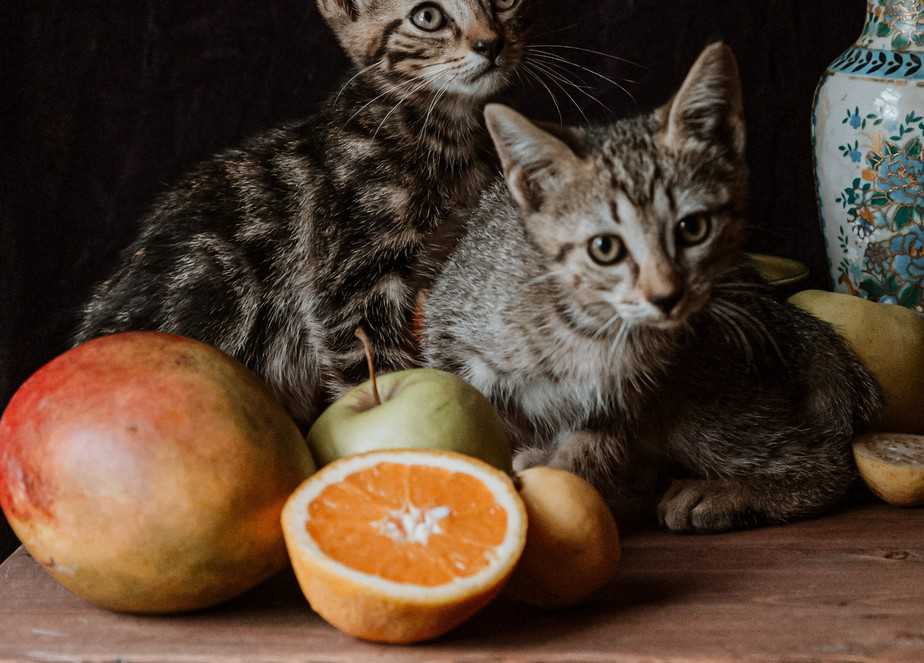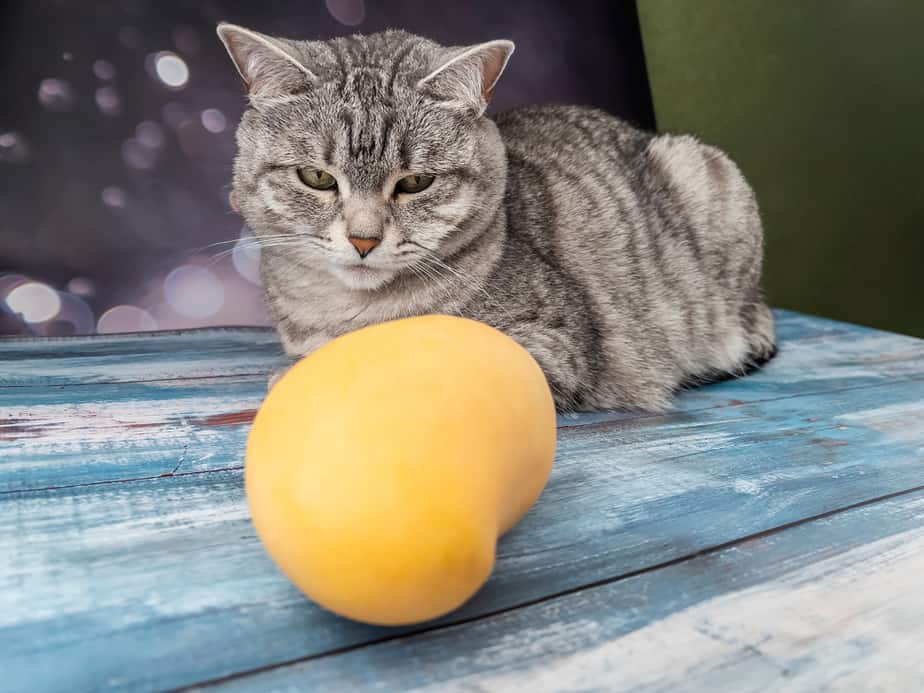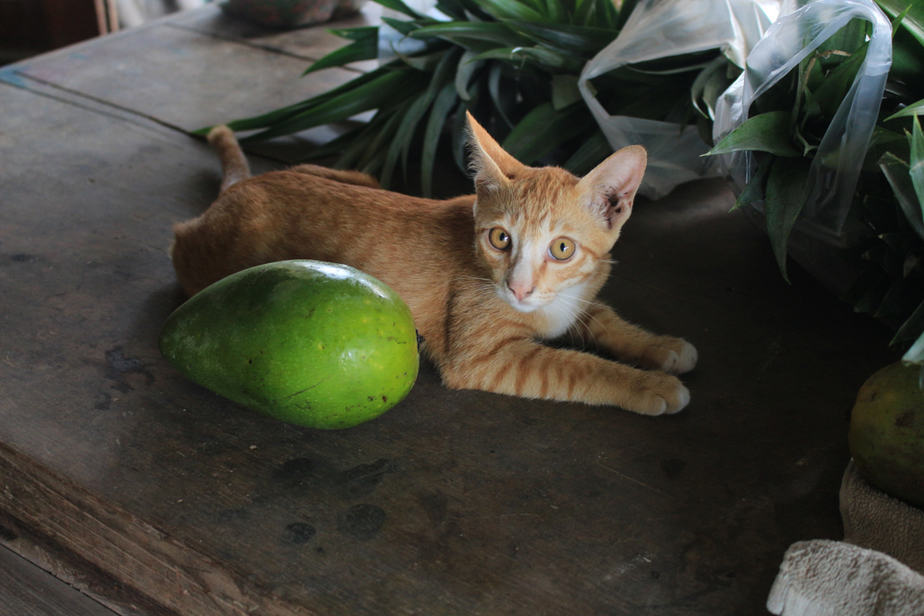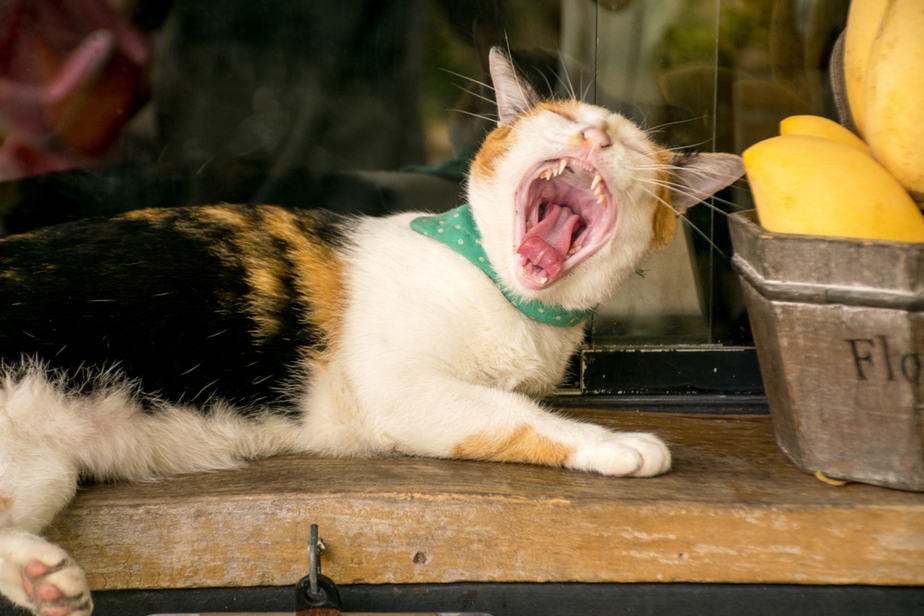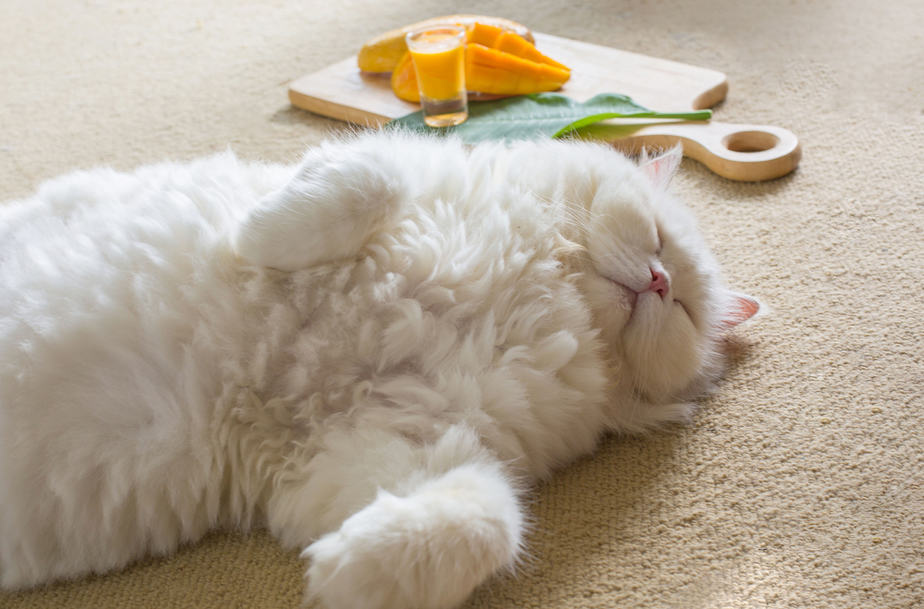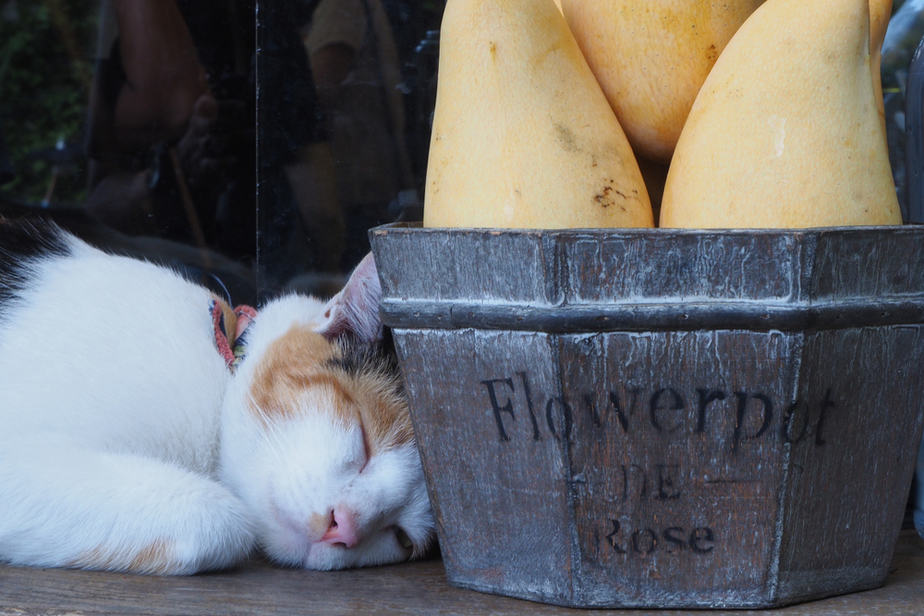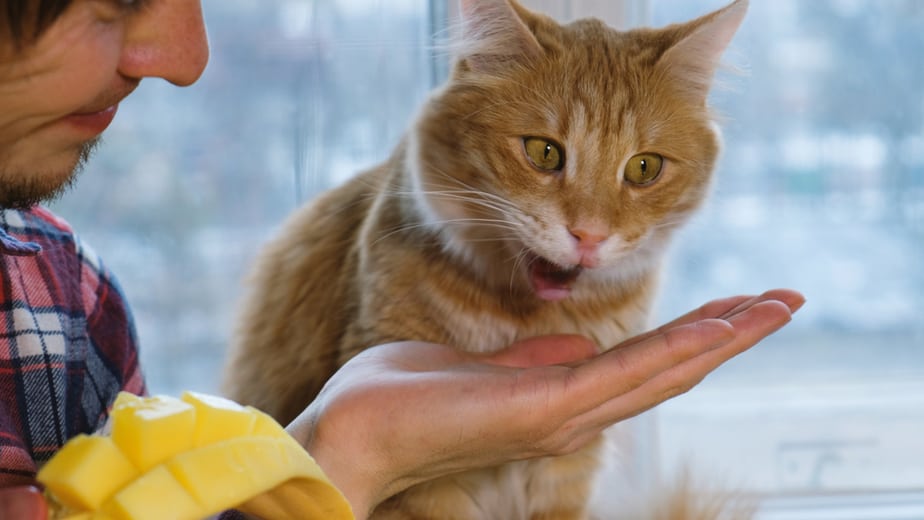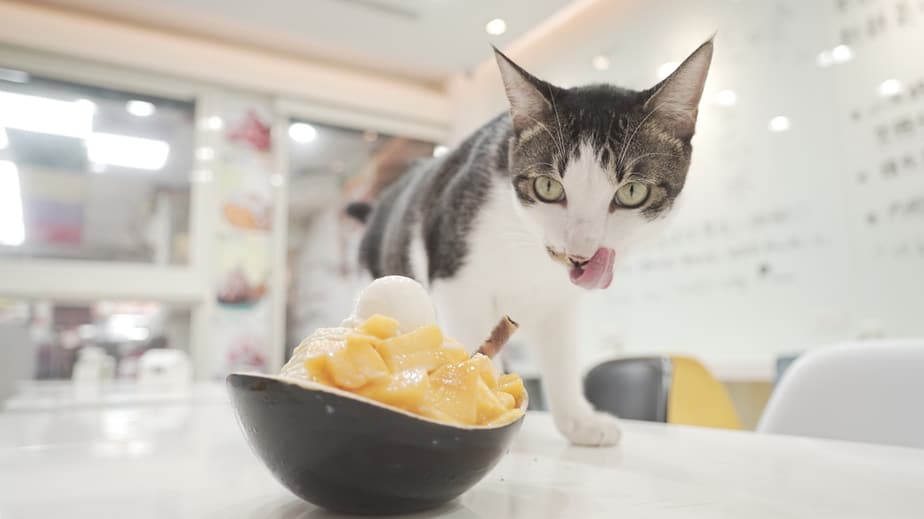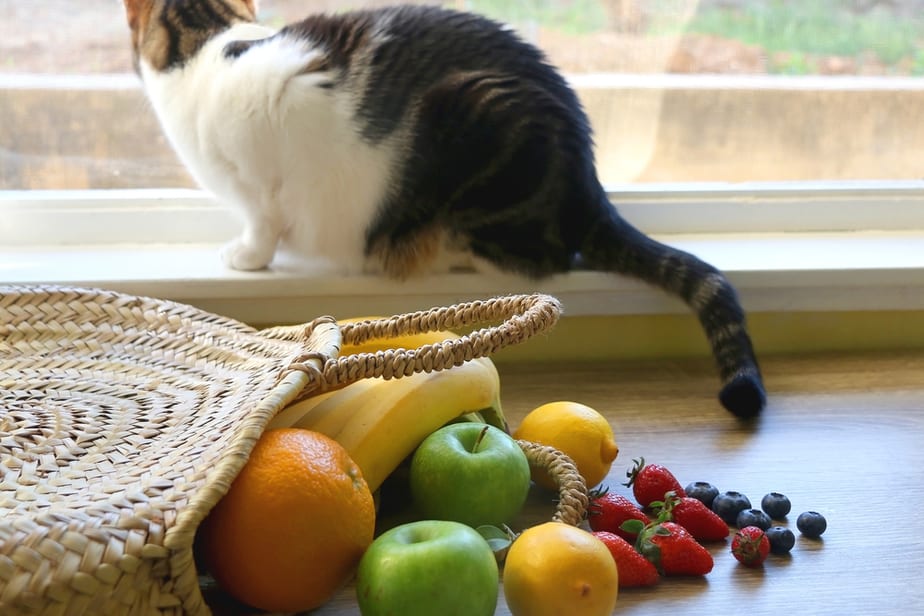📖 Table of Content:
”If he doesn’t appreciate your fruit jokes, you need to let that mango!” With that hilariously bad pun out of the way, let’s talk a bit more about this sweet, pitted treat. It’s a favorite among humans, so it’s no wonder your furry friend has been showing a sudden interest in it. Can cats eat mango!?
Let’s be honest, your mischievous monster doesn’t even try to mask her hungry curiosity for anything you put in your mouth. She simply stares at you until you cave in! She follows every step you take, especially if that step leads you into the kitchen!
This wouldn’t be the first time you decide to make a refreshing fruit salad, but you change your mind because you have no idea whether cats can eat fruit. You know better than to assume your boisterous beast isn’t going to make an attempt at stealing whatever’s on your plate.
Don’t lose your mind over it! While some fruits do contain parts that are toxic to cats, an occasional fruity treat won’t cause any harm to your precious pet. If you’re worried about those unfavorable parts you can always remove the skin, the pit, and the leaves. Now, you’re good to go!
So, can cats eat mango?
Cats can eat mango! When you’re done doing your little dancy dance, you should remember to take a couple of things into consideration. While this pitted fruit isn’t toxic to cats, you should only use it as an occasional treat rather than a regular meal.
You see, cats are obligate carnivores which means they need a bunch of meat in their diet. Their delicate little stomachs aren’t prepared to break down the amount of sugar and fiber most fruits contain. In turn, too much fruit can lead to intestinal irritation, bloating, or even diarrhea.
So, mangoes might be your favorite fruit but your precious pet shouldn’t eat too much. If she stumbles upon a rogue piece of mango and decides to have a feast, hold your horses. A tiny amount of this mouth-watering treat won’t cause her any harm.
Not only that, your precious purrincess isn’t likely to ask for seconds. She might enjoy satisfying her neverending curiosity and tasting something her humans eat all the time, but she isn’t likely to enjoy the flavor. This might shock you, but here it goes…
Cats don’t have sweetness receptors! Believe it or not, cats have a genetic defect that prevents them from tasting sweet things! This happened because one of the two genes responsible for making the said sweetness receptor got permanently switched off millions of years ago.
So, can cats eat mango? While cats can eat mango, it’s safe to say you shouldn’t include them in your cat’s regular diet. Introducing it as an occasional treat, on the other hand, might provide your precious pet with an array of nutritional and health benefits.
Can cats benefit from eating mango?
Absolutely! Most cat parents wouldn’t think to include fruits in their cat’s diet because they’re scared of going overboard. As long as you include it as an occasional snack, mango can become a great ally in keeping your precious pet healthy.
This tropical stone fruit is packed with essential vitamins and minerals! Next time you decide to make a refreshing mango salad, make sure to set aside some extra pieces for your favorite furball. After all, fruit makes for a great treat after a delicious meaty lunch!
So, can cats eat mango? If you’re still on the fence about the whole mango situation, take a look at the amazing benefits this fruit brings to the table!
1. Mangoes contain a bunch of vitamins
Not impressed? While it’s true that most fruits contain a ridiculous amount of vitamins, not all fruits contain vitamins necessary for your cat’s healthy growth and development. Luckily for you, mangoes are rich in vitamins A, B6, and C!
So, let’s dive in. Vitamin A is great for keeping your feline friend’s immune system in check. It’s important to remember that you shouldn’t go overboard with this particular vitamin as it can become harmful if consumed in excessive amounts. A single piece of mango it is!
Vitamin B6 is one of those essential vitamins your furball needs to stay happy and healthy. This particular vitamin has numerous benefits for cats. Participating in glucose generation, enabling niacin synthesis, driving the production of red blood cells – you name it, vitamin B6 does it!
Vitamin C needs no introduction! It’s essential for you and your cat as it has an important physiological role in various metabolic functions including growth and maintenance of the tissue, oxidative stress relief, and regulation of the immune system.
2. Mangoes are rich in minerals
Your precious purrincess requires several essential minerals in her diet. Minerals like iron, calcium, magnesium, potassium, sodium, and chloride ensure she lives a happy and healthy life. A severe lack of these chemical compounds might result in bone disease and muscle disorders.
Luckily for you, mango isn’t lacking in that department. This tropical stone fruit is considered incredibly high in potassium ranging from 100 milligrams to 220 milligrams per 100 grams. Being an electrolyte, potassium plays an important role in the conduction of electrical charges in your cat’s body.
That doesn’t mean you should let your boisterous beast go ham on mangoes! Too much potassium can pose an issue for cats with renal problems because their kidneys are responsible for filtering out excess minerals. It’s always best to control everything that goes in your cat’s mouth.
3. Mangoes are packed with fiber
Sometimes it feels as if fiber gets an unjustifiably bad reputation in the feline world. While it’s true that cats shouldn’t consume too much of it as it might hurt their delicate tummies, fiber can be a great ally in making sure your precious pet doesn’t spend too much time in her litterbox.
For lack of better words, fiber benefits the stool quality of cats who might otherwise have digestive problems. High-fiber foods like mangoes might help your feline friend with cases of constipation, diarrhea, diabetes, and even obesity.
While some other fruits and veggies are packed with fiber, mango takes the cake. A 100 grams of this tropical stone fruit can provide your feline friend with 1,6 grams of fiber. To avoid biting more than you can chew, you should treat mango as an occasional ”you’re the cutest little munchkin” snack.
4. Mangoes are incredibly hydrating
Cats are notoriously bad when it comes to drinking water. Your precious purrincess will eat pretty much anything in her way, yet when it’s time to take a sip of water she turns her snout the other way and leaves! Argh, she’s impossible!
Mangoes are coming to your rescue. Believe it or not, this sweet pitted fruit is approximately 83% water. If you can get your feline friend to munch on delicious mango cubes every now and then, she will be closer to reaching her daily hydration levels.
Eating foods with high levels of water might be the best way to prevent dehydration during those hot summer days. If your precious pet isn’t the biggest fan of fresh water, you might want to include some mango in her diet and keep an eye on symptoms like low energy, low appetite, and sunken eyes.
5. Mangoes are low in calories
This is great news for chunky kitties! As mentioned before, mangoes are approximately 83% water which makes them pretty low in calories (100 grams of mango has less than 60 calories). This tropical stone fruit should be a go-to treat for your overweight cat.
In addition to being low in calories, mangoes help in breaking down and digesting protein and fiber, which keeps the digestive tract working efficiently. While your chunky kitty might look adorable with all that extra fluff, feline obesity isn’t something you should take lightly. Mangoes for the win!
How should you feed mango to your cat?
To answer the age-old question ”Can cats eat mango?”, it’s important to take a couple of things into consideration. While mango in itself isn’t problematic to cats, excessive amounts of this sweet pitted fruit shouldn’t be included as a regular part of your cat’s diet.
Not only that, certain parts of mango are considered harmful to felines. You should be extra careful when planning to share this tropical stone fruit with your feline friend. In fact, you should consult with your vet before making any significant changes to your cat’s diet.
So, how exactly should you feed mango to your cat? Here’s what you need to do.
1. Wash your mango
The same rule applies to you, too! If you’re planning on enjoying some delicious mango cubes after dinner, you should make sure to wash your fruit beforehand. What if your precious purrincess decides to join the party?!
Let’s be honest, you have no idea where your mango comes from. Chances are this delicious fruit contains lots of pesticides so it’s always best to wash it thoroughly. While scrubbing it under running water might do the trick, I would also suggest making a warm lemon and baking soda bath.
You can soak your mangoes in this bath for as long as you want. These two ingredients will ensure the maximum level of cleanliness. You’ll be able to let your mischievous monster enjoy her after-dinner treat with no fear.
2. Remove the stem, skin, leaves, and seed
Please don’t skip this step if you’re planning on sharing this delicious fruit with your feline friend. Mango stem, skin, and leaves can cause harm to your cat’s digestive system as they contain an incredibly dangerous toxic called urushiol.
In fact, this is the same toxin that can be found in poison ivy! While these mango parts aren’t poisonous to humans, cats can suffer a severe reaction if they accidentally ingest them. If you notice symptoms such as lethargy, skin and eye irritations, and excessive scratching you should contact your vet.
Mango seed can also contain cyanide, a poisonous compound that can lead to cyanide toxicity. While it’s fairly difficult for cats to break the seed and release this compound, it’s better to be safe than sorry. Mango seeds can also be a choking hazard, so it’s best if you avoid them altogether!
3. Chop your mango into smaller pieces
You definitely don’t want your precious pet to eat an entire mango! After you’ve completed the other steps, you should chop your mango into smaller pieces or even blend it into a smooth puree. This is the best way to ensure your cat doesn’t consume too much of it!
Don’t forget to use these mango bites as an occasional treat rather than a regular meal. Too much of anything is bound to make your feline friend sick.
What are the downsides of feeding mango to your cat?
”Can cats eat mango? My friend’s neighbor told me that mango makes her cat’s poop smelly!”
While there aren’t many downsides to feeding your cat mango, you should take a couple of things into consideration. This mouth-watering fruit shouldn’t make your cat’s poop smelly, but it might negatively affect her digestive system if you’re not careful.
1. Mango contains too much sugar
If you’re a big fan of nutritional facts, you should know that 100 grams of mango contain about 14 grams of sugar. While sugar isn’t toxic to cats, you shouldn’t include too much of it in your cat’s regular diet. Her digestive system might have issues breaking down carbohydrates.
Eating too much mango can lead to digestive issues, diabetes, and obesity. If you’re worried your cat’s consuming copious amounts of sugar you should keep an eye out for symptoms like excessive thirst and urination, gait changes, vomiting, and lethargy. You can always contact you ver and consult with them!
2. Cats don’t require fruit in their diet
As mentioned before, cats are obligate carnivores. This means your cat thrives on a meat-based diet. Most of the essential vitamins and minerals should come from animal sources. Mangoes might be incredibly nutritious for humans, but cats couldn’t care less for them!
Your feline friend might be curious to know what you’re eating. You shouldn’t be afraid to share a couple of bites with her as mango isn’t harmful to cats. You can use it as an occasional snack, or as a way of getting her attention when she’s misbehaving. Other than that, there’s no place for mango in her diet.
Can cats eat dried mango?
Technically yes, but generally no. Dried mango isn’t toxic to cats which means your feline friend can enjoy it every now and then. But, she shouldn’t munch on it all the time since it contains a bunch of sugar, additives, and preservatives.
While fresh mango might be a healthier option, it’s possible you’re dealing with a picky eater. If your cat prefers the taste and texture of dried fruits, you shouldn’t be afraid to provide her with an occasional dried mango treat.
If you’re worried about those pesky additives and preservatives, you can always try making dried mango from scratch. Trust me, there are a bunch of helpful videos online making sure you succeed in your endeavor. It can also be a fun, bonding activity with your precious purrincess.
You might not have the time to DIY dried mangoes, and that’s completely fine. You can still feed your cat some commercially available dried mango, just make sure to keep track of her sugar intake. One of the biggest issues with this snack is the amount of sugar it contains.
Sugar is pretty much the source of all evil in the feline world. Too much of it can lead to numerous health issues including feline obesity, diabetes, and tooth decay. If you decide to let your cat have a taste, make sure you don’t leave the bag unattended.
Can cats eat other mango-based foods?
Who doesn’t love a delicious mango sorbet or even a mango ice cream? Since this tropical stone fruit seems to be popular in your household, it’s no surprise you’re wondering whether cats can eat other mango-based foods.
Mango sorbet is usually made with mango, sugar, and water. Some people like to add lemon or lime for that incredible refreshing tang, but it’s mostly made with simple ingredients. No worries, your cat can have a lick or two of your delicious mango sorbet!
This cold treat can do wonders for your precious pet during those hot summer days. Your cat can have some mango sorbet to cool off, and even reach her daily hydration levels. Don’t forget to keep an eye on her sugar intake as mango sorbet tends to be incredibly sweet.
Mango ice cream, on the other hand, might not be the best treat for your feline friend. You see, ice cream is usually made with milk or whipped cream. Cats don’t produce the enzymes necessary to digest milk and milk-based products. It’s best to avoid feeding your cat anything that might harm her.
The good news is that the internet is packed with DIY dairy-free ice cream recipes. Next time you have some extra mango lying around, you might want to make some homemade ice cream for your precious purrincess.
Lastly, remember to be extra careful when giving your cat cold treats like sorbets or ice creams. Cats are incredibly sensitive to brain freeze and you should do everything you can to prevent it from happening to your furry friend.
Can cats eat fruit other than mango?
Fruit isn’t an essential part of the feline diet. As mentioned before, your feline friend should eat a diverse diet packed with meat and other meat-based foods. That doesn’t mean she shouldn’t enjoy an occasional fruity treat.
Fruit is packed with vitamins, minerals, and antioxidants which can benefit your cat in the long run. Other than controlling the amount of fruit she consumes on a daily basis, there’s no reason why you shouldn’t provide your cat with a fruity nibble or two.
Most fruits aren’t harmful to cats, but you should still consult with your vet before making any significant changes to your cat’s diet. Papaya, peaches, and kiwi are only some of the most flavourful fruity treats your feline friend might enjoy.
Final verdict
Cats can eat mango! Mango is one of those foods that will leave your precious pet salivating and asking for more. This tropical stone fruit is incredibly flavorful, hydrating, and packed with vitamins, minerals, and antioxidants.
If you’re planning on sharing a delicious mango salad with your feline friend, remember to wash your mango thoroughly, remove the harmful parts (stem, leaves, skin, pit), and cut it into small cubes. Now you can relax and enjoy some well-deserved bonding time with your cat!
Related post: Can Cats Eat Pineapple? Is The Tropical Queen Bad For Your Furbaby?
